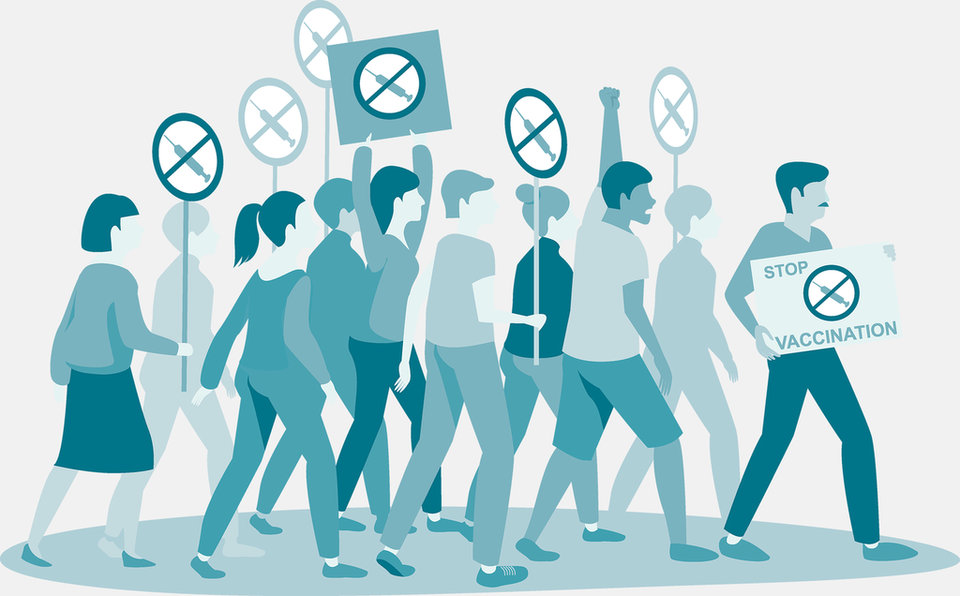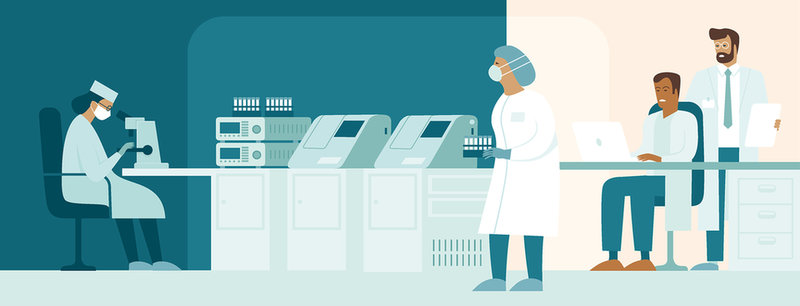
Vaccines
How to combat vaccine hesitancy in the age of Covid-19
Multiple Covid-19 vaccine projects worldwide are looking promising, and mammoth efforts are being made to gather all the glass vials and storage equipment needed to inoculate as many people as possible – but could the scourge of vaccine hesitancy hinder this effort? Chloe Kent examines why anti-vaxxers may resist a Covid-19 vaccine, and what can be done about it.
Engagement with anti-vaccine Facebook posts trebled between July and August in the UK. In the months since the Covid-19 pandemic began, thousands of people have repeatedly descended upon London’s Trafalgar Square to protest mass coronavirus vaccinations. According to an IPSOS Mori poll published earlier this year, only 53% of respondents said they were ‘certain’ or ‘very likely’ to get a vaccine, with 20% saying they were only ‘fairly likely’ to do so and 16% saying they were ‘unlikely’ to or definitely wouldn’t.
Even during a global pandemic, the anti-vaccine movement refuses to die.
In 2019, the World Health Organization (WHO) named vaccine hesitancy one of the top ten threats to global health. This was during a time when global uptake of the measles, mumps and rubella vaccine (MMR) vaccine had slipped down to 85%, well below the required 95% to prevent community transmission, leading to several global outbreaks of measles.
A growing vaccine hesitancy movement has contributed to decreasing vaccination rates in Europe and the US, particularly among cloistered communities who can be more vulnerable to disinformation campaigns, as was seen among New York’s Orthodox Jewish population last year.
While arguments against vaccination largely go against current scientific evidence surrounding their safety and efficacy, fears persist. Now, there is a chance that vaccine hesitancy could have a serious impact on the Covid-19 pandemic.
Speaking at the virtual WIRED Health:Tech conference this year, Vaccine Confidence Project director Professor Heidi Larson said: “You could have a good amount of the population going to take the [Covid-19] vaccine, but that little difference, that swing vote if you think of it in political terms, can make the difference between getting to herd immunity or not.”
Anti-vaxxers: a misinformed movement
New York Institute of Technology assistant professor Jonathan Berman, author of Anti-vaxxers: How to Challenge a Misinformed Movement,makes a distinction between anti-vaxxers, the vaccine hesitant and the under-vaccinated. The under-vaccinated are populations who haven’t been vaccinated due to issues of socioeconomic access but would do so otherwise.
The vaccine hesitant are people who have reservations about being vaccinated, but are still open to being assured that the treatments are safe and reliable. Meanwhile, anti-vaxxers are a more concrete, organised movement of people who actively try and suppress vaccination as a practise and prevent people from getting vaccinated, and their minds are far harder to change.
Berman says: “If you were to address their arguments perfectly, they would come up with new ones. The arguments don’t matter. They have this fear of vaccines that’s driven by emotion and stories their neighbours and friends have told them, which they use to justify those beliefs.”
The most well-known anti-vaxxer argument, that vaccines can cause autism, has been extensively debunked since the publication of the infamous bogus study which drew a link between the MMR vaccine and autism diagnosis in 1998.
If you want to go to school you need to be immunised, certain jobs will require you to be immunised.
Likewise, fears of ‘vaccine overload’ – the notion that giving multiple vaccines at once may overwhelm or weaken a child’s immune system – aren’t founded in reality, nor the idea that because vaccines have nearly eliminated a disease among a population there is no reason for inoculation to continue.
“One of the main things they argue is that the monetary incentive of pharmaceutical companies has led them to lie about the threat of infectious disease and develop vaccines, even though they actually hurt people,” says Berman. “Another is that the components in vaccines are somehow secretly more harmful than anyone lets on, that there’s mad cow disease in the vaccines, things like that.”
When it comes to a Covid-19, it’s not hard to see how conspiratorial beliefs like these could start to take hold. From proponents of the idea that the moon landings were faked by NASA and Stanley Kubrick to those who assert that former Commander in Chief Barak Obama is ineligible to be US President because he was born outside of the country – despite his Hawaiian birth certificate – major world events have a curious way of inspiring disbelief.
Over the past year, people have claimed that Covid-19 is spread by the 5G mobile network, that the disease has been created by the Chinese government as a bioweapon and that the pharmaceutical industry created the virus to boost drug sales.
“There are also arguments that are related to personal liberty, people say ‘no forced vaccines, no mandatory vaccines’,” says Berman. “Well, no one’s going to force you anyway. But most governments have incentives in place, so if you want to go to school you need to be immunised, certain jobs will require you to be immunised. I think it’s pretty likely with Covid-19 that certain industries will say ‘well, you can come back to the office if you can show proof of immunisation’, something like that.”

Vaccines aren’t always infallible
Of course, when combatting vaccine hesitancy, it’s crucial not to patronise or demean the people who are concerned by the prospect of having “a little bit of Covid-19” injected into them.
After the rollout of the human papillomavirus (HPV) vaccine to adolescent girls began in 2006, the injections became anecdotally linked to chronic fatigue syndrome, complex regional pain syndrome and postural tachycardia syndrome, among other chronic conditions. Extensive study has found no increase in cases of these conditions among people who have been vaccinated against HPV compared with people who have not, and the higher propensity of these diagnoses among women than men is also likely to have played a role. That, however, doesn’t mean their experience should be discounted.
Discussing the case at WIRED Health:Tech, Larson said: “We consistently have scientific data that there is so no specific link with the vaccines and the reactions, but the experience of the vaccination has created an anxiety reaction in many of these cases. We still need to deal with that and have empathy with the girls’ reactions, and not just focus on the specific scientific evidence of whether the vaccine was related or not.”
The HPV vaccine became anecdotally linked to chronic fatigue syndrome, complex regional pain syndrome and postural tachycardia syndrome.
While there’s no scientific evidence to support claims that the HPV vaccine can trigger chronic illness, that doesn’t mean all vaccines are infallible. In 2010, an increase in narcolepsy diagnoses across northern Europe was linked to the vaccine Pandemrix, which had been distributed to high-risk groups during the swine flu epidemic. A major study of four to 18-year-olds found that around one in every 55,000 jabs led to narcolepsy.
With more than 170 teams of researchers racing to develop a safe and effective vaccine for Covid-19, a disease which has wrought far more devastation than swine flu and for which the demand for inoculation is more urgent, the fear that a similar oversight could occur on an even larger scale is not unreasonable.
These fears are likely to be compounded by events like Russia’s Sputnik V vaccine for Covid-19 being authorised before Phase III testing, and the pausing of AstraZeneca’s vaccine trial after a participant fell ill with a rare inflammatory condition called transverse myelitis, which was thought to be a reaction to the vaccine.
How does the pharmaceutical industry build trust?
Research from DrugsDisclosed found that 54% of UK patients would not take a Covid-19 vaccine unless it has been tested for a least a year, and a further 74% said the same of allowing their children to be vaccinated. If over half the adult population in the country reject the vaccine in its early stages, this could significantly undermine efforts to fight the pandemic.
Yet, DrugsDisclosed also found 50% of patients said they would consider someone who rejected a Covid-19 vaccine to be an anti-vaxxer, foreshadowing a significant ideological divide over the issue.
But even people with full faith in the efficacy of vaccines can have little trust in large pharmaceutical companies, which is hardly surprising when considering events like the opioid crisis or the legacy of Martin Shkreli who specialised in hiking drug prices for profit.
“For years, patients have been kind of locked out of the conversation,” says DrugsDisclosed co-founder and former University of Copenhagen social pharmacy professor Claus Møldrup. “Pharma addresses its conversation to the authorities or to payers, as they have mostly been the ones deciding what medicines should be used on what occasions. There has been no real tradition for patients and pharma discussing with each other, and that creates a mistrust.”
The distrust of big pharma among the general public is so significant that a group of nine companies have pledged to only seek approval for safe and effective Covid-19 vaccines – something which really should have gone without saying.
There has been no real tradition for patients and pharma discussing with each other, and that creates a mistrust.
Three of these organisations – Moderna, AstraZeneca, and the ongoing collaboration between Pfizer and BioNTech – have already advanced into late-stage clinical trials, while Merck, GlaxoSmithKline, Johnson & Johnson, Sanofi and Novavax also signed the pledge.
“I think what’s really an issue here is that pharma companies and governments are in a hurry to get a new vaccine on the market and not really listening to the patients,” says Møldrup. “What happens then is that every time there is a study going on at some point with severe side effects, that will at some point create a mistrust.”
So, how can the pharmaceutical industry, alongside state public health bodies, reach out to the ever-growing vaccine hesitant demographic and ensure that they are inoculated against Covid-19, if and when a viable candidate is available? Really, it doesn’t boil down to facts or logic – it boils down to communication.
“Pharmaceutical companies need to have a really good communications plan in place, people who are skilled, qualified science communicators who both understand the science and understand how to do media well,” says Berman. “I see a lot of press releases, a lot of statements from CEOs. Really, to allay scientists fears we need peer-reviewed publications instead, and to allay the public’s fears we need a communications plan that lets journalists look at what’s going on inside these trials to help us to communicate to people why it’s safe.”